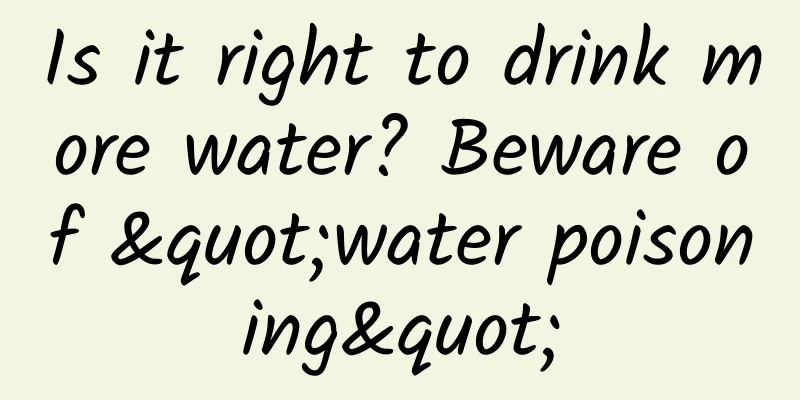Is it right to drink more water? Beware of "water poisoning"

|
Tired from exercise? Drink more water! Fever? Drink more warm water! Menstruating? Drink more hot water... In fact, drinking too much water can also cause poisoning! As long as the dose is sufficient, everything is "toxic". Recently, Ms. Lin from Shenzhen held her urine for a B-ultrasound during a physical examination and drank 3200mL of water on an empty stomach at one time. During lunch, she began to feel nauseous and vomit, and her hands and feet twitched and became unconscious. She was sent to the hospital for a checkup of electrolytes, which were "disordered" - low potassium, low sodium, and low chloride. The cranial CT scan showed mild edema of the brain tissue, and she was diagnosed with typical "water poisoning"! In fact, Ms. Lin's case is not an isolated one. "Water intoxication" incidents occur frequently both at home and abroad. A 28-year-old California woman drank about 6L of water in 3 hours during a water drinking competition. She then suffered abnormal vomiting and explosive headaches and died. Drinking 4L of water a day will really be too much! When the total amount of water taken in by the body greatly exceeds the amount of water discharged, water is retained in the body, causing a decrease in plasma osmotic pressure and an increase in circulating blood volume, which is called "water intoxication", also known as dilutional hyponatremia. In layman's terms, if you drink water in large gulps, drink a lot of water, and drink water endlessly, even if you are a sweat cow or a jellyfish, your body cannot absorb so much water in a short period of time. If you experience symptoms such as dizziness, vomiting, weakness, and rapid heartbeat after drinking a lot of water, you may be suffering from "water poisoning." In severe cases, convulsions, coma and other symptoms may occur. Treatment should focus on protecting heart and brain functions, dehydration, correction of hypotonicity and reducing the heart load. If treatment is not timely, it may lead to permanent damage to the nervous system or even death, so don't take it lightly. Not only drinking too much water or receiving too many intravenous drips can cause "water intoxication", but also excessive secretion of antidiuretic hormone caused by trauma, blood loss, shock and major surgery; renal insufficiency and decreased urination function; feeding too much water to normally breastfed babies under 6 months old and over-diluting milk powder can all cause "water intoxication". Is it true that you should drink 8 glasses of water every day? According to the requirements of the "Dietary Guidelines for Chinese Residents (2016 Edition)", adult males are recommended to drink 1700mL of water per day, while women are recommended to drink 1500mL, which is 7 to 8 cups of regular disposable water cups. The specific amount of water to drink should also be adjusted according to age, diet, temperature, amount of exercise, sweating, physical condition, etc. Just like eating, drinking water also needs to be done at regular times and in fixed quantities. Change from passive drinking to active drinking, and drink water before you feel "thirsty". When you feel thirsty, upset, weak, or have a headache, it means that your body cells have begun to dehydrate, and drinking water at this time is "passive drinking". Over time, the human body will be in a state of potential water shortage for a long time, which is not conducive to normal metabolism. For special groups, such as the little beasts, it is different. "Water intoxication" is common in babies under 6 months old. For babies, their kidneys are not fully developed. If they drink too much water, it will lead to "water intoxication", drowsiness, anorexia, vomiting, convulsions, coma, and even death. Therefore, it is necessary to determine the amount of water to drink according to the age and physical condition of the baby. Babies who have not added complementary food: Under normal circumstances, babies under 6 months old do not need water intake other than breast milk and formula milk. This is because the water content of breast milk and properly prepared formula milk can already meet the baby's physical development needs. Babies who are adding complementary foods: Babies after 6 months have mostly started to eat complementary foods other than breast milk, and their water intake sources are more abundant. Therefore, you can add a small amount of boiled water to your baby after eating or between meals. How much you drink depends on your baby's own needs, and parents don't need to force them to drink water. The amount of water that the elderly drink every day is not much different from that of adults. It should not be less than 1200mL per day, and 1500-1700mL is appropriate. Water should be replenished in the best time such as after getting up in the morning, 1 hour before meals, and 2.5 hours after meals. "Drink more water" is not as good as "know how to drink water" The way to deal with water shortage is to drink water, but drinking water also has its own rules. You need to pay attention to the following points: 1. Drink 100-150 mL of water each time and swallow it slowly in several times. This will fully moisten the mouth and effectively relieve thirst. Patients with cardiovascular and cerebrovascular diseases should drink water more "elegantly", drink it in several times, in small sips, and swallow it slowly. 2. The temperature of drinking water should not be too hot or too cold. The most suitable temperature is 10℃ ~ 30℃, which can achieve the purpose of cooling down and quenching thirst without hurting the stomach and intestines. 3. After strenuous exercise or high-temperature work, you will sweat a lot, so it is best to drink some light salt water. In addition, fruits and vegetables such as watermelon, cucumber, and tomato are rich in water, and are also rich in various antioxidants, minerals, and important B vitamins. Eating more of them is very beneficial for enhancing human immunity, preventing aging, and resisting diseases. "Drinking more water" is not as good as "knowing how to drink water". Following the principle of drinking water in "small amounts, multiple times, and slowly", and replenishing water scientifically, can keep the body in a state of water balance at all times and better promote health. Jointly released by the Science and Technology Development Center of the Chinese Pharmaceutical Society and the Science Popularization Department of Guangming Online |
<<: When is the best season to eat cherry tomatoes? Cherry tomato varieties
>>: Rumor debunked: Can you take just the medicine in the capsule without eating the "shell"?
Recommend
What causes bleeding in women during sexual intercourse?
Sexual life has many benefits for women, such as ...
Is cervical conization painful?
Cervical conization is a bit painful because it r...
Rubbing ginger on the scalp will help hair grow? Some people may even get balder the more they rub!
...
How to make donkey-hide gelatin cake? Should homemade donkey-hide gelatin cake be refrigerated or frozen?
Ejiao cake is a nutritious food. Eating it in mod...
Polycystic ovary endometrial thickening
We all know that the uterus is the most important...
Why is my period dark on the first day?
Women can judge whether their menstruation is nor...
What food is good to eat when you have stomach discomfort? These 6 are the first choice
Diet therapy is one of the effective preventive a...
Can I get pregnant if I just had an abortion?
Many women actually experience unexpected pregnan...
What are some yoga techniques for reducing belly fat?
After giving birth, many people's lower abdom...
Life Encyclopedia丨@What is the effective bed-staying posture for patients who have difficulty getting up?
Have you ever had this kind of trouble: no matter...
Treatment for dizziness and chest tightness in pregnant women
Dizziness and chest tightness in pregnant women h...
What are the symptoms of chest inflammation?
Chest inflammation is also quite common among wom...
What is the normal progesterone level at 42 days of pregnancy?
Everyone knows that a certain level of progestero...
A woman's sitting posture reveals her personality
Everyone’s behavioral habits and thinking pattern...
Does it hurt to put on a pessary?
A pessary is a very common medical device for tre...









